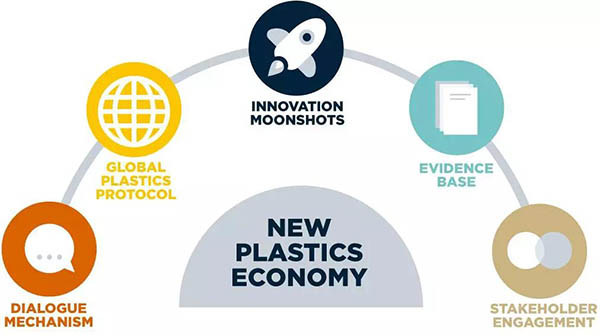Recently, the Ellen MacArthur Foundation, in cooperation with the United Nations Environment Programme (UNEP), released the latest report, revealing the positive progress in the prevention of plastic pollution around the world.
The report is the first progress report released on the first anniversary of the launch of the global commitment to the new plastics economy. The report highly transparently announced the progress of more than 200 enterprises and governments in promoting the circular economy of plastics by changing the production and use of plastics.
The global commitment to the new plastic economy was launched in October 2018, and put forward the vision of plastic recycling economy. Now more than 400 organizations have signed commitments to eliminate problematic and unnecessary plastic packaging, promote packaging innovation, realize 100% reusable, recyclable or compostable plastic packaging, and ensure the safe and convenient circulation of plastic packaging without becoming waste or pollution source.
Optimistic progress: reduction, reuse and regeneration
"After a year of hard work, we have made good progress. Including reducing the use of original plastic, introducing the pilot project of reuse, and the unprecedented market demand for recycled plastic packaging. "Sander defruyt, head of the global commitment to the new plastics economy at the Allen MacArthur Foundation, said. "But we have a long way to go. Accelerate action and redouble efforts to promote more enterprises and governments to take action to eliminate plastic pollution from the source. "
Enterprise aspect
Progress includes Unilever's announcement that it will reduce the use of raw plastics in its packaging by 50%; Mars says it will achieve a 25% reduction by 2025; and PepsiCo's goal is to reduce the use of raw plastics in its beverage business by 20% by 2025.
Policy aspect
Rwanda, the United Kingdom, Chile, Sao Paulo, Brazil, Austin and other countries have also formulated a series of policies and measures to promote the circular economy, including public procurement and extended producer responsibility program (EPRs), public education, financial measures and incentives to promote R & D projects.
Product aspect
Some plastic products and materials defined as problematic are being eliminated on a large scale. For example, about 70% of the commitment signatories are phasing out disposable straws, shopping bags and carbon black plastics, and about 80% of the commitment signatories are phasing out PVC materials in their packaging.
Eng Anderson, executive director of UNEP, said
To solve the problem of plastic pollution, we need to fundamentally realize the transformation from linear economy to circular economy, which is the core of the global commitment of new plastic economy. The progress report reveals how leading companies and governments are acting in a systematic way, proving that the new plastics economy is significant at both the commercial and political levels. There is great development potential in this area, and there is no reason why we should not take action.
UNEP called on all relevant businesses and governments to join the global commitment to fight against plastic pollution as part of the "zero pollution earth" implementation plan.
Today, an average of 60% of the plastic packaging of business participants is reusable, recyclable or compostable, the report said. By joining the global commitment, the proportion will rise to 100% by 2025.
Consumer packaged goods and retailer participants have pledged to more than quintuple the amount of recycled plastic in packaging from 4% to 22% by 2025. By 2025, their total demand for recycled ingredients in packaging will exceed 5 million tons, equivalent to 25 million barrels of oil saved per year.
The treatment of plastic waste and pollution means not only strengthening recycling, eliminating problematic and unnecessary plastic packaging, but also through the redesign of innovative technology, innovative products and supply chain, as well as the transformation of business model, so that the company can reduce the overall use of plastic packaging, while creating and releasing new economic opportunities.
Other examples of positive developments in the circular economy include: a $1.5 billion commitment by indorama ventures, a plastics producer, to ensure that by 2025, the annual capacity of recycled PET will reach 750000 tons; the UK government will mobilize about ¡ê 3 billion to improve local recycling and recycling infrastructure through a public-private financial plan; and packaging innovation. In addition, the recycling company that signed the global commitment promised to quadruple its recycled plastic production by 2025.

